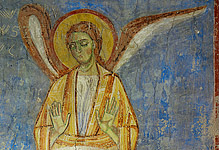
Angels general
Rainer Maria Rilke, the Second Elegie, translated by A. S. Kline
Every Angel is terror. And yet,
ah, knowing you, I invoke you, almost deadly
birds of the soul. Where are the days of Tobias,
when one of the most radiant of you stood at the simple threshold,
disguised somewhat for the journey and already no longer
awesome (Like a youth, to the youth looking out curiously).
Let the Archangel now, the dangerous one, from behind the stars,
take a single step down and toward us: our own heart,
beating on high would beat us down. What are you?
Early successes, Creation's favourite ones,
mountain-chains, ridges reddened by dawns
of all origin - pollen of flowering godhead,
junctions of light, corridors, stairs, thrones,
spaces of being, shields of bliss, tempests
of storm-filled, delighted feeling and, suddenly, solitary
mirrors: gathering their own out-streamed beauty
back into their faces again.
For we, when we feel, evaporate: oh, we
breathe ourselves out and away: from ember to ember,
yielding us fainter fragrance. Then someone may say to us:
'Yes, you are in my blood, the room, the Spring-time
is filling with you'..... What use is that: they cannot hold us,
we vanish inside and around them. And those who are beautiful,
oh, who holds them back? Appearance, endlessly, stands up,
in their face, and goes by. Like dew from the morning grass,
what is ours rises from us, like the heat
from a dish that is warmed. O smile: where? O upward gaze:
new, warm, vanishing wave of the heart - :
oh, we are that. Does the cosmic space,
we dissolve into, taste of us then? Do the Angels
really only take back what is theirs, what has streamed out of
them, or is there sometimes, as if by an oversight, something
of our being, as well? Are we as mingled with their
features, as there is vagueness in the faces
of pregnant women? They do not see it in the swirling
return to themselves. (How should they see it?)
Lovers, if they knew how, might utter
strange things in night air. Since it seems
everything hides us. Look, trees exist; houses,
we live in, still stand. Only we
pass everything by, like an exchange of air.
And all is at one, in keeping us secret, half out of
shame perhaps, half out of inexpressible hope.
Lovers, each satisfied in the other, I ask
you about us. You grasp yourselves. Have you a sign?
Look, it happens to me, that at times my hands
become aware of each other, or that my worn face
hides itself in them. That gives me a slight
sensation. But who would dare to exist only for that?
You, though, who grow in the other's delight
until, overwhelmed, they beg:
'No more' -: you, who under your hands
grow richer like vintage years of the vine:
who sometimes vanish, because the other
has so gained the ascendancy: I ask you of us. I know
you touch so blissfully because the caress withholds,
because the place you cover so tenderly
does not disappear: because beneath it you feel
pure duration. So that you promise eternity
almost, from the embrace. And yet, when you've endured
the first terrible glances, and the yearning at windows,
and the first walk together, just once, through the garden:
Lovers, are you the same? When you raise yourselves
one to another's mouth, and hang there - sip against sip:
O, how strangely the drinker then escapes from their action.
Weren't you amazed by the caution of human gesture
on Attic steles? Weren't love and departure
laid so lightly on shoulders, they seemed to be made
of other matter than ours? Think of the hands
how they rest without weight, though there is power in the torso.
Those self-controlled ones know, through that: so much is ours, this is us, to touch our own selves so: the gods
may bear down more heavily on us. But that is the gods' affair.
If only we too could discover a pure, contained
human place, a strip of fruitful land of our own,
between river and stone! For our own heart exceeds us,
even as theirs did. And we can no longer
gaze after it into images, that soothe it, or into
godlike bodies, where it restrains itself more completely.
Psalm 103, 20
Bless the Lord, ye his angels, that excel in strength, that do his commandments, hearkening unto the voice of his word.

#15040661
Rood cross from Seckau Abbey church; Christ, Saint Mary and S...

#15040662
Gilded chandelier from the bishop's chapel in the Seckau Abbey chur...

#15040663
Coronation of Saint Mary by the Trinity. Altar. The Trinity, Father, Son...

#15040745
Nave of the church Assumption of Saint Mary,Aldersbach. After 1746. Frescos by C...

#15040746
Ceiling fresco of the church in Aldersbach: angels announce the birt...

#15040747
Angel of the Annunciation, detail from the altar of the Virgin Mary.

#16010139
Interior of the Monastery church of Rottenbuch,Bavaria. The monastery of the Aug...

#16010140
High altar of the Monastery church of Rottenbuch, Bavaria.The monastery of...

#16010141
Putti in the the Monastery church of Rottenbuch, Bavaria.The monastery of...

#16010146
Donor's monument for Duke Odilo and his duchess Hiltrud in Saint Margare...

#16010147
Donor's monument for Duke Odilo and his duchess Hiltrud in Saint Margare...

#16010151
Side-altar with last supper and Christ crucified. Church of the Augustinia...